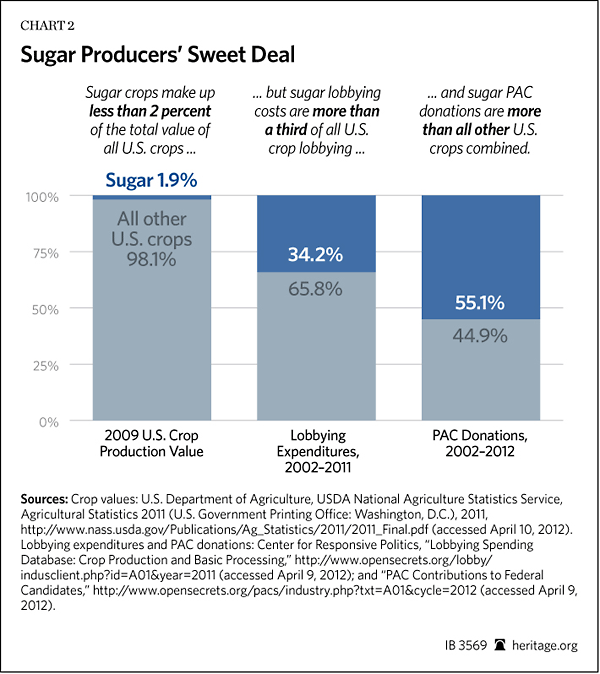Sugar producers contribute only a small percentage of value to overall U.S. crop production, yet the industry continues to reap the rewards from government thanks to a significant lobbying presence and sizable campaign donations.
The result is government interference in the sugar market, which dates to the 1930s Depression. American consumers pay the price in the form of higher prices.
This week’s chart depicts sugar’s sweet deal. When the federal government hands out favors to sugar producers, they turn around and fund lobbyists and political action committees, leading to yet another case of crony capitalism.
“Sugar accounts for just 1.9 percent of the value of total U.S. crop production, but sugar producers fund 55 percent of crop-related political action committee (PAC) donations and 34.2 percent of crop-related lobbying expenses,” writes Bryan Riley, the Jay Van Andel senior policy analyst in trade policy at Heritage. “This behavior can result in ‘crony capitalism’—a system in which business success depends on a close relationship with the government.”
Trade barriers artificially inflate prices by implementing quotas that limit the amount that food manufacturers and consumers can buy from other countries. Riley explains: “If a bakery or a candy company wants to import more sugar than is allowed under the government’s quota, it must pay a prohibitive tariff of 15.36 cents per pound for raw sugar. At current prices, that works out to a whopping 62 percent tariff rate.”
The U.S. sugar policy also costs taxpayers more every time they choose to buy their favorite candy, cereal or any other sugar-containing product. Studies by the American Enterprise Institute and Sweetener Users Association peg the cost to consumers between $2.4 billion and $3.5 billion per year.
Riley suggests eliminating the sugar program by giving Americans the choice to remove caps on sugar imports. And don’t just take his word for it. The late Milton Friedman once said: “There are so many stupid things that government is doing that, clearly, it would be in the self-interest of the public at large to have repealed. Who would—who can really on logical grounds defend sugar quotas? There’s no way of defending sugar quotas.”

































5 Replies to “Chart of the Week: Crony Capitalism Leads to Higher Sugar Prices”